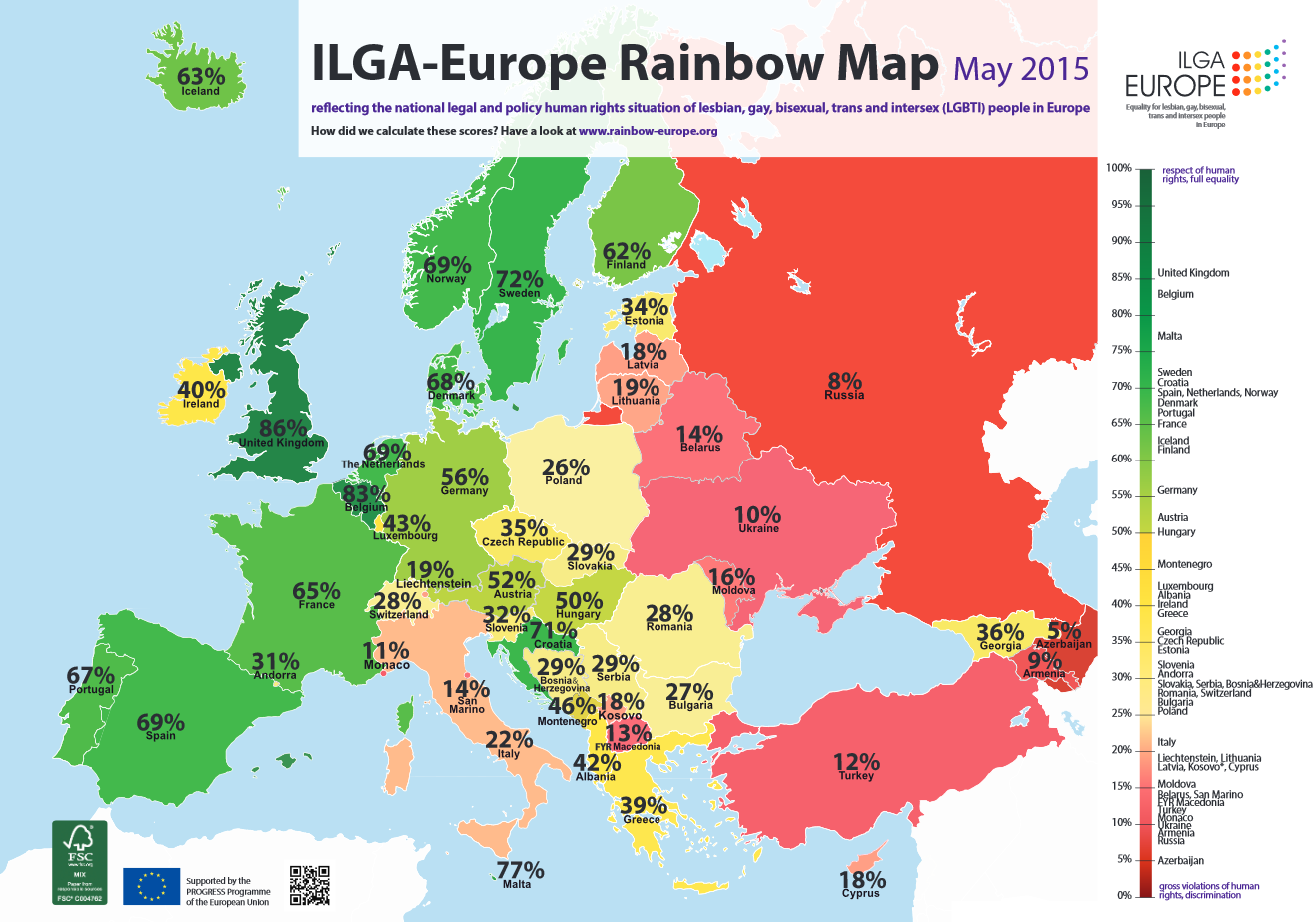10 ways to improve LGBT rights in Europe
Stay up to date:
Gender Inequality
Europe is arguably the best continent for LGBT rights today. When asked which countries were most gay-friendly, a recent survey showed that 8 out of the top ten were in Europe.
For all of its progress, Europe as a whole still has much work to be done. In May 2015, ILGA (the International Lesbian, Gay, Bisexual, Trans and Intersex Association) released its LGBT equality ratings. The UK and Belgium lead the continent with over 80% of full equality achieved in both countries. Much of western Europe also achieves high levels of equality, but as the map moves further east, those numbers begin to plummet.
Since February 2014, the European Union has been working to create a “roadmap against homophobia“. That roadmap has yet to be clearly laid out, but a new list of actions to advance LGBT Equality has been published by the European Commission. These are the ten recommendations from that report:
Closing the EU-level gap in protection against discrimination
We can improve the lives of LGBT people by wiping out discrimination in education, social protection and access to goods and services. The EU wants an Equal Treatment Directive. While many European countries have anti-discrimination laws, and some legislation does exist within the EU, this directive would “considerably broaden the antidiscrimination areas covered by EU law.”
Simplifying bureaucracy for LGBT families moving in Europe
Moving from one EU member state to another can be difficult for an LGBT family, in particular with concern to public documents. The Commission is proposing legislation that would remove a lot of the red tape, and make the circulation of important documents and other information easier. The wider goal of this initiative is to “avoid the need for legalization or other formalities, and in so doing contribute directly to the creation of a citizens’ Europe.” In practice, this could help LGBT families in avoiding lengthy processes to prove marriages, adoptions, and other civil documentation matters.
Properly enforcing EU laws
Laws are only as strong as their enforcement. The goal is to ensure that nations within the EU are enforcing those laws correctly and fully. This will include gender legislation, protecting victims of crime (in particular crimes of homophobia and transphobia) as well as asylum and freedom of movement laws.
Campaign to improve social attitudes
A lot of negative stereotypes still exist about LGBT people. Those stereotypes lead to discrimination and bullying. The EU wants to put an end to that by raising awareness about the rights and social acceptance of LGBT people, with a particular focus on sports, schools, youth, and an expanded education about transgender and intersex people.
Supporting member states in key policy areas
Each member state is responsible for promoting LGBT rights. Change has to be local, and the EU wants to strengthen its support to member states to help them improve local efforts to improve education, health, non-discrimination and combat hate crime and hate speech.
Financial support for projects on LGBT
Much of the work to improve education and offer better services to LGBT people will require further resources. As of 2016, new funding will be allocated to member states to help combat hate crime and hate speech. Support for projects, both private and public, promoting equality, diversity and anti-discrimination will also be part of the project. Erasmus, Europe’s student exchange programme, will also be included to promote better education of Europe’s youth with regards to LGBT issues.
Supporting businesses and inclusive workplaces
The EU knows LGBT rights is good for business. They want to set up a list of best practices and strong examples to follow in the workplace. The European Commission also plans to lead by example. They are preparing their own diversity strategy which they intend to publicise later.
Improving available data on the situation of LGBT people
Data about the present situation for people within the LGBT community can be spotty and unreliable. To improve this, the EU wants to create a number of new reports to bring accurate data to light including:
- Non-Discrimination and Fundamental Rights
- Health-inequalities
- Education
- Hate crime / hate speech
- Free movement of LGBT families
- Intersex
- Transgender/gender legal recognition
Looking beyond the EU’s borders
LGBT rights do not end at the borders of Europe, and the EU wants to be part of the fight for equality on a global scale. To do this, they are actively involved in the establishment of the ‘ERA-LGBT Equal Rights Association of Western Balkans and Turkey’ network.
Working with the rest of the world
Outside of neighbouring EU nations are ‘third countries’, basically the rest of the world. The EU wants to continue its efforts through its work with the UN and through its delegations and embassies.
Author: Donald Armbrecht is a freelance writer and social media producer.
This is part of a Agenda in Focus collection of posts on LGBT rights.
Image: People walk behind the European Union’s flag during the annual gay parade in Budapest. REUTERS/Karoly Arvai
Don't miss any update on this topic
Create a free account and access your personalized content collection with our latest publications and analyses.
License and Republishing
World Economic Forum articles may be republished in accordance with the Creative Commons Attribution-NonCommercial-NoDerivatives 4.0 International Public License, and in accordance with our Terms of Use.
The views expressed in this article are those of the author alone and not the World Economic Forum.
Forum Stories newsletter
Bringing you weekly curated insights and analysis on the global issues that matter.
More on Equity, Diversity and InclusionSee all
Silja Baller
May 15, 2025
Tea Trumbic and Dhivya O’Connor
May 13, 2025
Harrison Lung and Hatem Bamatraf
May 7, 2025
Zainab Azizi
April 9, 2025





